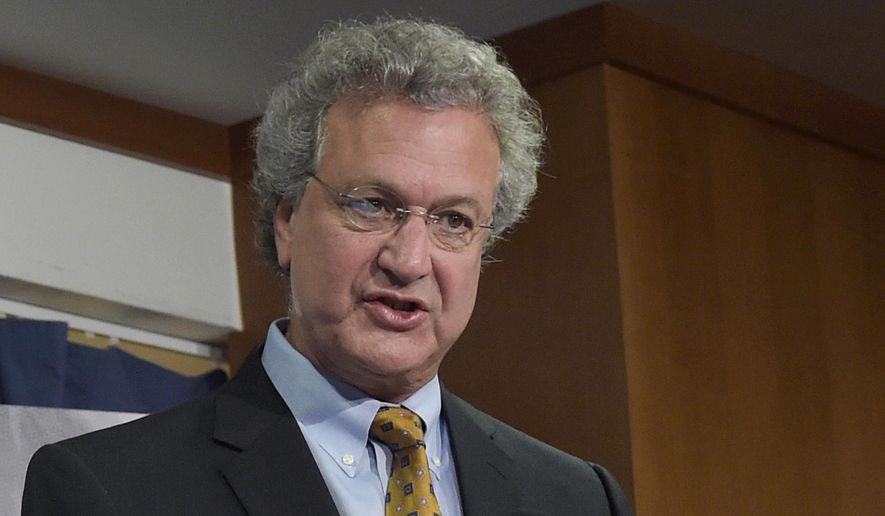Southern Poverty Law Center president Richard Cohen announced his resignation Friday, a stunning departure that eradicates the top leadership of a civil-rights behemoth amid allegations of workplace discrimination and harassment.
Mr. Cohen, who joined the SPLC in 1986 and has served as president since 2003, said he wanted to “take responsibility” for the problems that have roiled the SPLC, culminating last week in the sudden exit of founder Morris Dees.
“Whatever problems exist at the SPLC happened on my watch, so I take responsibility for them,” Mr. Cohen said in a statement obtained by the Montgomery [Alabama] Advertiser.
He also asked the board to “immediately launch a search for an interim president in order to give the organization the best chance to heal.”
The SPLC has hired Tina Tchen, former chief of staff to First Lady Michelle Obama, to conduct an internal review after the March 14 dismissal of Mr. Dees, who founded the group in 1971.
No reason was given for his exit, but the Alabama Political Reporter and Los Angeles Times reported it was spurred by allegations of sexual harassment and racial discrimination.
“Given my long tenure as the SPLC president, however, I do not think I should be involved in that process beyond cooperating with Tina, her team, and the board in any way that may be helpful,” said Mr. Cohen in his statement.
Another top lieutenant, legal director Rhonda Brownstein, who had worked there for nearly three decades, tendered her resignation on Thursday, according to the Montgomery Advertiser.
In a statement Friday evening, Cohen said he asked the SPLC board to “immediately launch” a search for an interim president. https://t.co/iZFnBhJqmg
— MontgomeryAdvertiser (@MGMAdvertiser) March 22, 2019
In a Thursday op-ed, Bob Moser, who worked as an SPLC writer from 2001-04, called the SPLC a “highly profitable scam.”
He said employees were uncomfortable with the organization’s “constant drive for more money,” as well as racial disparities in hiring and Mr. Dees’ “reputation for hitting on young women.”
“The work could be meaningful and gratifying,” said Mr. Moser in an article for the New Yorker. “But it was hard, for many of us, not to feel like we’d become pawns in what was, in many respects, a highly profitable scam.”
He referred to the “guilt you couldn’t help feeling about the legions of donors who believed that their money was being used, faithfully and well, to do the Lord’s work in the heart of Dixie. We were part of the con, and we knew it.”
The SPLC has long been criticized for stoking over-the-top fears of the Ku Klux Klan to juice its prodigious fundraising. Founded in 1971, the organization boasts an endowment of nearly $500 million, easily surpassing that of black-led civil-rights groups like the NAACP.
Mr. Moser appeared to have no problem with the “hate map” designations, other than they helped “religious-right” groups raise money “by decrying the S.P.L.C. ’attacks.’”
But he called the KKK focus “a seemingly odd mission,” given that the Klan was “a spent force by the mid-eighties, with only an estimated ten thousand members scattered across the country.”
He pointed to a racial divide among those working in the “Poverty Palace,” the SPLC’s opulent headquarters in Montgomery, with almost all black employees working as administrative or support staff, while the professional staff was almost entirely white.
“The firing of Dees has flushed up all the uncomfortable questions again,” Mr. Moser said. “Were we complicit, by taking our paychecks and staying silent, in ripping off donors on behalf of an organization that never lived up to the values it espoused? Did we enable racial discrimination and sexual harassment by failing to speak out?”
Mr. Moser cited the discrepancy between the SPLC’s claims of success in fighting extremism and its “hyperbolic fundraising appeals” insisting that “hate” was always on the rise and “more dangerous than ever.”
“’The S.P.L.C.—making hate pay,’ we’d say,” Mr. Moser said. “It wasn’t funny then. At this moment, it seems even grimmer.”
In a March 14 statement, Mr. Cohen praised Mr. Dees’ contributions but said that “when one of our own fails to meet those standards, no matter his or her role in the organization, we take it seriously and must take appropriate action.”
Mr. Cohen said the organization has a “wonderful staff” of 350 people in five Southern states.
“Right now, our work couldn’t be more critical,” he said. “The SPLC is in good hands for many years to come.”
• Valerie Richardson can be reached at vrichardson@washingtontimes.com.




Please read our comment policy before commenting.